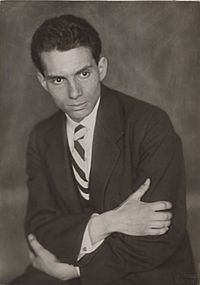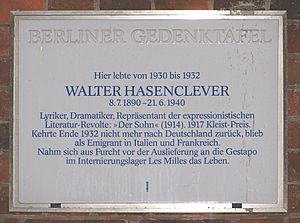Walter Hasenclever facts for kids
Quick facts for kids
Walter Hasenclever
|
|
|---|---|

Hasenclever c. 1917
|
|
| Born | Walter Georg Alfred Hasenclever 8 July 1890 Aachen, Germany |
| Died | 22 June 1940 (aged 49) Les Milles, France |
| Occupation | Poet, Playwright |
| Nationality | German |
| Literary movement | Expressionism |
| Notable works | The Son (1914) |
Walter Georg Alfred Hasenclever (born July 8, 1890 – died June 22, 1940) was a German Jewish poet and writer of plays. He was known for his unique style called Expressionism. When the Nazis came to power, his books were banned. He had to leave Germany and live in France. Sadly, he was put in prison there because he was seen as an "enemy foreigner." He passed away in Les Milles, a place near Aix-en-Provence.
Contents
Growing Up and Education
Walter Hasenclever was born in Aachen, Germany. His father, Carl Georg Hasenclever, was a doctor. In 1908, Walter started studying law at Oxford University. Later, he moved to the University of Lausanne to continue his studies.
From 1909 to 1914, he studied in Leipzig. During this time, he became very interested in literature (books and writing) and philosophy (the study of big ideas about life).
His Career as a Writer
In 1910, Walter Hasenclever published his first book of poems. It was called Towns, nights and people (Städte, Nächte und Menschen).
His play The Son (Der Sohn) became very popular in 1914. It was one of the first successful plays written in the Expressionist style.
War and Awards
At first, Hasenclever supported the idea of war and joined the military service. But soon, he changed his mind and did not want to fight anymore. He pretended to be unwell to be released from duty in 1917.
In that same year, he won the Kleist Prize. This was a special award for his powerful version of the ancient Greek play Antigone by Sophocles.
He was good friends with the artist Oskar Kokoschka. In 1918, Kokoschka painted a picture of Hasenclever with his friend Käthe Richter. This was when Hasenclever was recovering in a special place in Dresden.
Life in Paris and Berlin
In 1924, Hasenclever met the writer Kurt Tucholsky. Around this time, he worked as a correspondent for a German newspaper, reporting from France. He spent a lot of time in Paris. There, he also became friends with the French playwright Jean Giraudoux.
He wrote two successful comedies: A Better Gentleman (Ein besserer Herr) in 1926 and Marriages are Made in Heaven (Ehen werden im Himmel geschlossen) in 1928.
In 1930, he wrote movie scripts for the film company Metro-Goldwyn-Mayer. He even wrote for the famous actress Greta Garbo. At this time, he lived in Berlin in a special area known as an "artists' colony."
Exile and Death
When the Nazis came to power in Germany in 1933, they banned Walter Hasenclever's books. His works were burned and removed from libraries. Because of this, Hasenclever had to leave Germany and went to live in Nice, France. In 1934, he married Edith Schläfer there.
During the Second World War, Hasenclever was put in prison twice in France. He was seen as a "foreign enemy." When France was taken over by Germany, he was in a prison camp called Camp des Milles in the south of France. He died there on June 22, 1940.
His Legacy
Since 1996, a special award called the Walter Hasenclever Prize has been given out every two years. It honors German-language writers. Some of the winners include Peter Rühmkorf (1996) and George Tabori (1998).
The money for this prize comes from the Walter Hasenclever Society, the town of Aachen, the Schiller Society, and Hasenclever's old school, the Einhard Gymnasium.
Selected Films
Here are some films that Walter Hasenclever worked on:
- Ein besserer Herr (1928)
- Diary of a Coquette (1929)
- Love Songs (1930)
- Rendezvous (1930)
- Men Behind Bars (1931)
See also
 In Spanish: Walter Hasenclever para niños
In Spanish: Walter Hasenclever para niños
 | May Edward Chinn |
 | Rebecca Cole |
 | Alexa Canady |
 | Dorothy Lavinia Brown |


